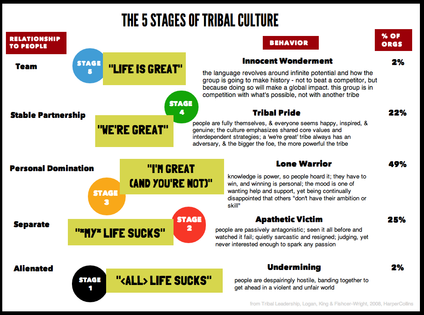The Power of Triads
In a powerful book called Tribal Leadership (download a free audio version here), the authors describe their research of cultures and how they discovered five sequential stages that generally determine how good someone feels.
The stages are as listed below—NBA legend Phil Jackson makes frequent references to these in his book Eleven Rings, so they must be good—but today I want to look at a specific tool that takes people from the average stage into one where people are happier and more thriving.
This simple tool is building triads: relationships between three people, instead of two.
The idea is so simple that we often do not think about it. Yet in their research, the authors discovered that biggest element setting apart thriving, happy cultures from less developed one was triads. The third person holds the relationship between the other two accountable, ensuring respect, integrity, honor, stability, and growth.
How many of your close relationships exist just between you and the other person? How often do you set a lunch or coffee date with two professional contacts instead of one?
So for today’s hap, plan a meeting with two close friends whose relationship you’d like to deepen. During this convo, follow the Tribal Leadership advice:
“Listen for the values underneath it all when your companions speak. Discover mutuality. Then say what connects the two people at a deep level. You will instantly create a triad.”
Stage One – ‘Life Sucks’ Most people are socially alienated, and the theme of their words is that life has given them a bad deal, so it’s ok to do whatever it takes to survive.
Stage Two – ‘My Life Sucks’ Most people do the minimum to get by, show almost no initiative or passion, and engage in passive-aggressive behavior. The dominant culture for 25 percent of workplace tribes—think Dilbert comics and Office Space.
Stage Three – ‘I’m Great (and you’re not)’ – (49% of organizations are here)‘People engage in anything that’s going on, with energy and commitment, but when you listen closely, they talk mostly about themselves and focus on appearing smarter and better than others. They think they’re focused on team concerns, but their actions show their interest is personal. People tend to form two-person relationships, so if they manage of group of ten, they have ten relationships. They rarely bring people together, they resist sharing information except when it’s necessary, and they pride themselves on being better informed than others. Winning is all that matters, and winning is personal. People at this stage complain that they don’t have enough time or support and that the people around them aren’t as competent or as committed as they are.’
Stage Four – ‘We’re Great’ ‘Teams are the norm, focused around shared values and a common purpose. Information moves freely throughout the group. People’s relationships are built on shared values. They tend to ask, “what’s the next right thing to do?” and to build ad hoc partnerships to accomplish what’s important at the moment. Their language focuses on “we,” not “me.” If two people get in a squabble, a third will step in and repair the relationship rather than create a personal following for himself. Unlike Stage Two, the group is composed of people who have played the Stage Three game and won – and are ready for genuine partnerships.’
Stage Five – ‘Life is Great’ ‘Your tribes hardly ever refer to the competition, except to note how remarkable their own culture is by comparison, and how far their results outstrip industry norms. The theme of communication is limitless potential, bounded only by imagination and group commitment. People in this culture can find a way to work with almost anyone, provided their commitment to values is at the same intensity as their own. (Unlike Stage Four, the focus isn’t on “our values” but on resonant values.) There is almost no fear, stress, or workplace conflict. People talk as though the world is watching them, which may well be the case, as their results are making history.”

